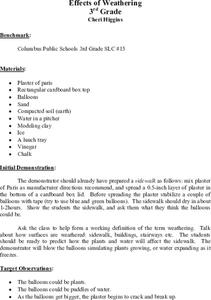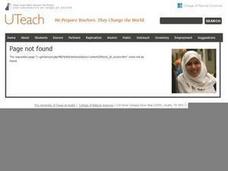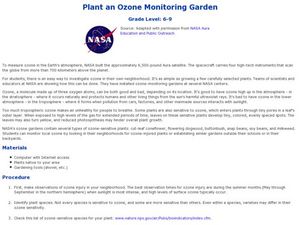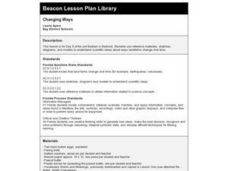Science 4 Inquiry
Edible Plate Tectonics
Many people think they can't observe plate tectonics, but thanks to GPS, we know that Australia moves at a rate of 2.7 inches per year, North America at 1 inches per year, and the Pacific plate at more than 3 inches per year! Scholars...
Curated OER
Science: Trouble in the Troposphere
Students research a NASA Website and record information about an assigned city's tropospheric ozone residual monthly climate. In groups, they graph the information for the past year. They form new groups and compare their city's...
Curated OER
Fossil Fuels (III), The Geology of Coal: Interpreting Geologic History
Students hypothesize about why various samples of coal have different characteristics. Pupils use information that they found during Internet searches to ascertain the validity of their hypotheses and verify the "story" of coal. ...
Curated OER
The Spectrum of a Star
Tenth graders identify stars based on their line spectra. In this astronomy lesson, 10th graders analyze spectrograph and determine the elements present in the star. They explain the relationship between temperature and star classes.
Curated OER
Comparison Activities
Students explore the size of the sun and it's temperature. Using the Internet, students visit given websites to compare the sun's diameter, outer layers, and mass to visual items students can relate to. They also compare the sun's...
Curated OER
Wave Math
Students identify the different factors affecting the size and shape of ocean waves. For this math lesson, students calculate wave speed and wavelength given a mathematical formula.
Curated OER
Effects of Weathering
Here's a great geology lesson for 3rd graders on weathering and erosion of soil. After a class discussion on how nature can "move a mountain," learners take a look at how a modern phenoma called acid rain can also cause weathering and...
Science Matters
Slip Sliding Along
The San Andreas Fault is the largest earthquake-producing fault in California. In the seventh instructional activity in the 20 part series, pupils create maps of California, focusing on the San Andreas Fault system. The comparison...
Curated OER
Biomes: Extreme Climate
Young scholars discuss the causes of global warming. In this earth science lesson, students examine how global warming is connected to the arctic and world climate. They write a paragraph about their interconnection.
Curated OER
Environment: Battling for Oxygen
Students construct an interactive ozone depletion model using gumdrops and toothpicks. After analyzing the data obtained from the model, they record it on butcher paper and complete worksheets about oxygen.
Curated OER
Effects of Ozone in the Air
Fifth graders, in groups, conduct an experiment in which they measure ground level ozone levels using an ozone measuring kit. They analyze and compare the weather conditions and locations where ozone readings are highest and lowest.
Curated OER
Climate Change: Is there a Controversy
Students explore climate changes. In this climate changes lesson, students research what causes changes. Students search the Internet, summarize reports they find and create a poster with the information.
Curated OER
Greenhouse Effect: Pop Bottle Experiment
Students explore global warming by conducting a weather experiment. In this greenhouse gas lesson, students define the greenhouse effect and the impact on our ozone layer. Students utilize a soda pop bottle, floodlight bulb, thermometers...
Curated OER
Greenhouse Gases: The Chemistry Behind the Culprits
Ninth graders investigate the effect of different gases in the atmosphere. In this chemistry activity, 9th graders explain how these gases contribute to global warming. They suggest possible solutions to this growing problem.
Curated OER
Plant an Ozone Monitoring Garden
Students create a garden. In this ozone lesson, students discuss ozone injury, identify plants sensitive to ozone, and then plant their own ozone garden.
Curated OER
Frogs Frogs Frogs
Students view a disk on the continental movement and analyze the given data on fossils, rock types and climate zones. In this geology lesson students draw a diagram of the earths layers, take a quiz complete a PowerPoint presentation.
Curated OER
What's the Connection Between Convection and Inversion?
Ninth graders observe a simulation demonstrating the difference between convection and inversion. They explain where and when convection and inversion layers occur and how each impacts air quality, and by connection, human health.
Curated OER
Using Radiosonde Data From a Weather Balloon Launch
Student use radiosonde data from a weather balloon launch to distinguish the characteristics of the lower atmosphere. They learn the layers of the atmosphere. They graph real atmospheric data.
Curated OER
Ice Core Clues
Students create a PowerPoint presentation on the information they research about the ice cores and what they tell us about Earth's past. In this ice core lesson plan, students research radioactivity, air pollution, sodium, snowfall...
Curated OER
What's the Difference?
Pupils discover how volcanic processes differ at convergent and divergent tectonic plate boundaries. They identify three geologic features that are associated with most volcanoes on Earth.
Curated OER
Weather and Atmosphere
Seventh graders explain the layers of the atmosphere. They identify the causes of air pollution. They analyze real world weather data. They explore and describe clouds. They develop models to explain atmosphere and weather.
Curated OER
Determining the Percolation Rate of Soil
High schoolers discover how water moves through different types of soils. In groups, they use the same sample from a previous activity and empty it into a milk carton in which they have layered with cheesecloth to determine the...
Curated OER
Core
Eighth graders examine conditions that can lead to the formations found and correlate the layers. In this rock layers lesson students complete an activity that allows students to take their own "core sample".
Curated OER
Changing Ways
Third graders examine hard boiled eggs as possible models for the earth's layers.
Other popular searches
- Science Earth Layers
- Earth Science Earth's Layers
- Earth Science Earth Layer
- Science Layers of the Earth

























